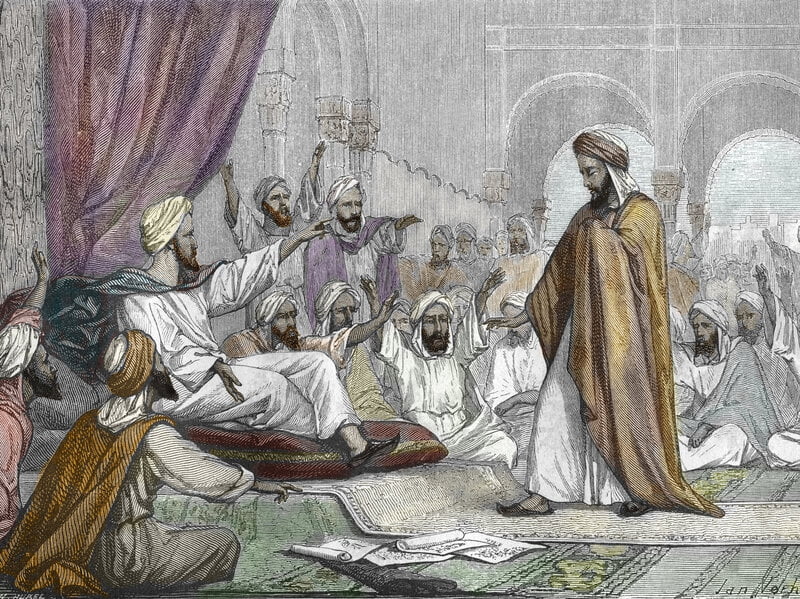
Islamic Philosophy and Kalām
The field of “Islamic philosophy and Kalam” at the master’s level is a complete educational course, in accordance with the regulations and approvals of the Supreme Planning Council of the Ministry of Science, Research and Technology of Iran, which consists of two main areas: Islamic philosophy and Islamic word. Islamic word has been a theological tradition alongside Islamic philosophy, which aims to rationally defend the main teachings of Islam. Of course, with basics and pillars that are not the same as basics and pillars of Islamic philosophy. These two traditions, especially in Iran, have been continuous and uninterrupted intellectual traditions that have not been extended to the modern era. The prerequisite for education in these two areas is a sufficient mastery of Arabic and logic.
The philosophy that entered the Islamic world in the early Islamic centuries did not exceed two hundred topics, but Islamic philosophers and sages extended these topics to seven hundred. Iranians, in the light of the Shia school, paid more attention to the matter of reason than other Islamic schools, and with the inspiration of the Qur’an and the traditions of the Ahl al-Bayt, they gave the philosophy of Islam a noble color. The emergence of the Masha school represented by Ibn Sina, the Ishraq school represented by Sohravardi, and the Hikmat al-Taaliyeh school represented by Sadal Mutalahin Shirazi shows the effort and endeavor of Iranian Muslims in the promotion and flourishing of philosophy.
One of the most important aspects of this field at this stage is to create a foundation for the education of scholars and experts in various fields of Islamic philosophy and Kalam. Graduates of this field can rationally explain the main teachings of Islam and defend them rationally.
Also, they can be recruited as the scientific staff of the country’s universities and researches in the field of Islamic philosophy and Kalam and play a cultural educational role in the society as a religious cultural consultant, teacher, and instructor.
Having a bachelor’s degree or equivalent is enough to study in this field. This certificate must be the official license of Iran in the country where it is issued. Foreign students applying to study in this field can study in this field regardless of their bachelor’s degree. Based on this, any person who has studied outside of Iran with any field of study at the bachelor’s level, if they have scientific qualifications and are members of the scientific faculty, are permitted to study in this course. Of course, having books, scientific and journalistic articles and being interested in participating in this field can be influential in the scientific field of the group.
The length of the Master’s course in “Islamic Philosophy and Kalam” is 2 years and equal to 4 semesters. The length of each semester is equal to 16 weeks and the number of lessons per unit is one hour per week. If, according to the decision of the educational group, 2 years is enough to pass compensatory courses or finish the thesis, another two and a half years should be added to the two-year educational period. The Master’s program “Islamic Philosophy and Theology” consists of 44 units, of which 28 units are main courses, 10 units are compensatory courses and 6 units are thesis. The student is required to complete all the main units and the thesis, as well as according to the bachelor’s field in which he will graduate, the number of compensatory courses at the discretion of the educational department.
Lessons such as “Philosophy of Mulla Sadra; Ontology”, “Philosophy of Mulla Sadra. Kalam”, “Philosophy of Mulla Sadra; Psychology and eschatology”, “Sinawi philosophy”, “Philosophy of illumination”, “Sinawi logic”, “New logic” and “New theological issues” are among the specialized courses that are taught in the field of Islamic philosophy and Kalam.
- Total cost of the course for Iranian students who are admitted through the national entrance exam or internal university exam (2021-2022): 18 million tomans (The fee covers the student’s educational costs and does not include living expenses such as food and accommodations.
- Total cost of the course for Iranian students who are admitted through the national entrance exam or internal university exam (2021-2022): 4 thousand dollars (The fee covers the student’s educational costs and does not include living expenses such as food and accommodations.
The applicants must submit the following items to apply to the on-campus master’s programs of the University of Religions and Denominations:
- A completed application form.
- An electronic copy of the passport or a valid residence permit.
- An electronic copy of the high school diploma and bachelor’s degree or their equivalent and a certified Persian, English, or Arabic translation of the transcripts.
- The original high school diploma and bachelor’s degree or their equivalent and a certified Persian, English, or Arabic translation of the transcripts.
- One recently taken photo of the applicant, size 30x40mm.
- Applicant’s CV indicating education and work experience (optional).
By clicking on the “Apply now” button next to each program, you will be transferred to the registration portal, where you can upload and submit your application documents. Your application will not be complete until all the required items are submitted.
